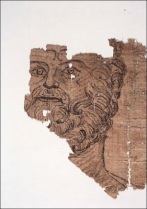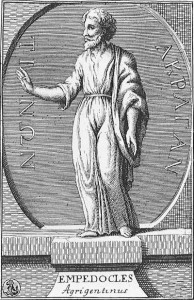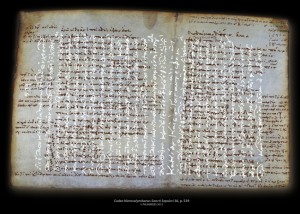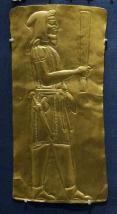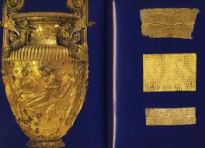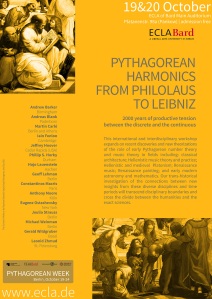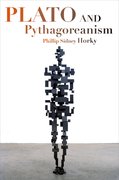I’m drowning in marking right now, but I thought I’d update with some recent work I’ve been doing on Aristotle and Plutarch on the geometry of the Pythagorean Philolaus of Croton. This working paper (comments welcome) is for a volume edited by Arnaud Macé on Physis/Historia Peri Physeôs, and derived from a series he has been co-organizing with Luc Brisson and Olivier Renault on ‘Plato and his Predecessors’. As often happens, however, one cannot really discuss ‘Plato and his Predecessors’ without treating Plato’s successors too. Case in point is Plutarch’s Table-Talk, where the only surviving reference to Philolaus’ conceptualization of geometry is preserved:
‘Geometry being, according to Philolaus, the origin and mother-city of the rest (?)…’
γεωμετρία κατὰ τὸν Φιλόλαον ἀρχὴ καὶ μητρόπολις οὖσα τῶν ἄλλων…
(T A7a Huffman = Plutarch, Table-Talk 8.2, 718e; translated after Huffman)
The original context for testimonium A7a is remarkable: it is a staged debate in Plutarch’s Table Talk that takes place between Plutarch and several speakers (Diogenianus, Tyndares, Florus, and Plutarch’s son Autobulus) on Plato’s birthday.[1] Apropos of the day, the topic set for the symposium is to discover what Plato meant when he allegedly claimed that ‘god is always doing geometry’ (ἀεὶ γεωμετρεῖν τὸν θεόν).[2] The first speaker, the youthful Tyndares of Sparta, develops a mystical response rooted in his unique interpretation of Plato’s Republic and Phaedo, and in the midst of this he elaborates on the relationship between γεωμετρία and other scientific studies.[3] Notably, Tyndares believes that geometry – not arithmetic, as one would see in Plato’s Republic and other Platonist traditions that descend from it – is first in pride of place among the mathematical sciences.
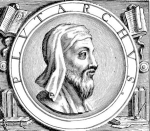
Plutarchus Geometricus
Philolaus’ reference to γεωμετρία as the ‘origin’ and ‘mother-city’ implies some sort of generative capacity, as Aristotle in F 203 thought of the Pythagoreans’ ‘unit’ (διὰ τοῦ γεννητικὴν αὐτήν), which generates odd numbers when added to even and even numbers when added to odd.[4] Aristotle’s assumption seems to be that a unit, when applied to (προστιθεμένη) an odd or even number, produces differentiation between those types of number.
But how could the objects of geometry, e.g. shapes such as triangles and squares, conceivably produce numerical kinds, such as ‘odd’ and ‘even’? Interestingly, a few chapters after he has quoted Philolaus’ enigmatic geometry testimonium T A7, Plutarch presents a speech, given by his son Autobulus, which appears to feature adaptations of Philolaic ideas in a Platonist vein, including a discussion of how the limit gives definition to the unlimited.[5] There, Autobulus refers to the cosmological theory of the ‘men of old’ (οἱ παλαιοί), a rather certain reference to Philolaus even in Plato’s work[6], that involves the generation of numbers through the imposition of the limit on matter, which is unlimited (περατοῦντα τὴν ὕλην ἄπειρον οὖσαν):
Τhe form and shape is a limit of everything that is shaped and arranged (ἡ μορφὴ καὶ τὸ σχῆμα πέρας ἐστὶ μεμορφωμένου καὶ ἐσχηματισμένου παντός), in the absence of which everything is, by itself, shapeless and unarranged. Once the numbers and ratios have been generated in it (ἀριθμῶν δὲ καὶ λόγων ἐγγενομένων), the matter is shackled, as it were, and encompassed by lines and by the figures which are generated by lines, i.e. the solids…
(Plutarch, Table-Talk 8.3, 719d)
This description of how the geometric shape, as limit, comes upon the unlimited and generates numbers is surprisingly unusual in antiquity, despite the fact that it forms the basis for some modern interpretations of the relationship in Pythagorean philosophy between limiters and unlimiteds.[7] The generation of number is initially obscure in Autobulus’ account. A little later, however, Autobolus returns to the topic and explains with greater precision how he thinks ‘numbers and ratios’ can be generated in matter:
Reason (λόγος)[8] seizes upon [matter], circumscribes it, and marshals it into types and differentiations (τοῦ δὲ λόγου καταλαμβάναντος αὐτὴν καὶ περιγράφοντος καὶ διανέμοντος εἰς ἰδέας καὶ διαφοράς), from which all things that grow possess generation and structure (ἐξ ὧν τὰ φύομενα πάντα τὴν γένεσιν ἔσχεν καὶ σύστασιν).
(Plutarch, Table-Talk 8.3, 719e)
This is a remarkable passage, since it does not, in fact, reflect Plutarch’s own views about the first principles, but nevertheless seems to represent a reputable opinion that comes to contribute to Plutarch’s own formulation. For Plutarch himself in the speech that follows (Table-Talk 8.2, 720a-c) gently rebukes his son and explains, echoing the Timaeus, that the three first principles are in fact the One/God, Matter/Indefinite Dyad, and the Form, not simply the limit and unlimited.[9] Although Plutarch does not refer to Philolaus as the authority behind Autobulus’ speech, he appears to be thinking of the Pythagoreans (‘men of old’) – and quite possibly he is deriving this information from Aristotle’s lost works on the Pythagoreans, which understood the first principles as limit and unlimited (πέρας ἄπειρον) and as equivalent to odd and even.[10]
I suggest that Autobulus’ speech can therefore help us to conceive of how Aristotle’s Pythagoreans might have conceived of the ‘unit’ as generating odd and even numbers.[11] If the ‘unit’ in Aristotle’s language stands in for the ‘limiters’ (περαίνοντα) in Philolaus’ presentation, and ‘reason’ (λόγος) in Autobulus’, then the ‘unit’ would be thought to interact with a limitless continuum in such a way as to produce numerical types (i.e. ‘odd’ and ‘even’), which could thereby be differentiated from one another epistemologically. In this scenario, Aristotle would be attributing to the Pythagoreans’ ‘unit’ the role of the formal cause, which, in its modality as limiter, would give definition to the unlimited, in its modality as matter.[12] In fact, Aristotle has more to say about this process elsewhere. In the context of discussing Philolaus’ student, the mathematical Pythagorean Eurytus of Metapontum, and his theory of defining natural objects through number, Aristotle attacks some anonymous Pythagoreans who (a) equivocated number with harmony and (b) thus absurdly supposed that number could be formal cause[13]:
Nor yet has it been determined in what sense numbers are the causes of substances and of being, whether as boundaries (ὠς ὅροι)[14] (for example, as lines are to magnitudes – in this sense Eurytus assigned which number belongs to which thing, e.g. this number for man, that for horse; just as those who arrange numbers into geometric figures like the triangle and the square, so he [sc. Eurytus] assimilated the shapes of natural objects to pebbles), or because harmony of numbers is a ratio [of numbers] (ἢ ὅτι λόγος ἡ συμφωνία ἀριθμῶν)[15], and likewise so is man and everything else?
How could the attributes white, sweet, and hot, be numbers? And it is clear that numbers are neither a substance nor formal causes[16], since the ratio is the substance, whereas the number is matter. For example, the substance of flesh or bone is a number [only] in this sense: it is three parts of fire, and two of earth. Again, number, whichever it is, is always a number of things, either of portions of fire or earth or units, whereas substance is the proportion of one quantity to another in a mixture. But this no longer remains a number, but a ratio of the mixture of numbers, whether corporeal or otherwise. So number – whether number in general or number that consists of abstract units – is neither an efficient cause, nor matter [sc. material cause], nor ratio and form, of things [sc. formal cause] (οὔτε…ὕλη οὔτε λόγος καὶ εἶδος τῶν πραγμάτων). Nor again is it the final cause.
(Aristotle, Metaphysics 14.5, 1092b8-25)
Aristotle seeks to identify the proper ontological status of numbers by reference to, I suggest, mathematical Pythagoreans in general, and Eurytus and Philolaus in particular. He associates the definitional activities of Eurytus with the geometry of some anonymous others, whose activity of arranging numbers into geometrical shapes Aristotle sees as anticipating Eurytus’ assimilation of numbers to objects in nature, such as human beings and horses. If we are in doubt to whom Aristotle is referring, one possible clue comes at the end of the passage, where he notes that it would be absurd to think that number (of any sort) could be the formal cause, i.e. the ‘ratio and form of things’ (λόγος καὶ εἶδος τῶν πραγμάτων), a phrase which recalls Philolaus’ appeal to the ‘being of things’ (ἁ ἐστὼ τῶν πραγμάτων) as an entity prior to limiters and unlimiteds, and which, so I have speculated elsewhere, Philolaus probably identified with harmony (ἁρμονία).[17] If the ‘things’ to which Philolaus appealed when he referred to ‘limiters’ and ‘unlimiteds’ were to be thought of as numbers, as Aristotle seems to have assumed in his reformulation of Fragment 1 of Philolaus[18], then the ‘limiters’ would likely be odd numbers, and the ‘unlimiteds’ even numbers. The position Aristotle seems to be attacking, then, is one which conflates a formal cause like ‘ratio’, ‘harmony’, or ‘proportion’, which Aristotle considers a legitimate candidate for such an activity, with ‘number’, which is not a legitimate candidate for formal cause, on the grounds that number is that which is acted upon by the formal cause, which in this case is ‘ratio’ (λόγος); this in turn would function as the limiter that acts upon number, which is here figured (at least provisionally) as matter that is acted upon.
[1] For a biographical discussion of these figures, see Cartledge and Spawforth 2002: 166.
[2] Plut. Quaest. Conv. 8.1, 718c.
[3] Plut. Quaest. Conv. 8.1, 718c-f.
[4] ] Arist. F 203 Rose = Alex. Aphr., in Metaph. p. 40.15–20 Hayduck: ‘…they thought the unit to be the origin of numbers, since it was composed out of the unlimited and the limited; for the unit was simultaneously even-odd, which he [Philolaus?] demonstrated by way of the unit’s being generative of both the odd and the even number. For the unit added to an even generates an odd, and the unit added to an odd generates an even.’
[5] I suspect we are dealing with a Platonized version of an Aristotelian description (probably from the lost works of Aristotle on the Pythagoreans) that predates the 1st Century BCE (since Autobulus does not actually attribute this cosmology to the Pythagoreans, and it does not resonate particularly well with other 1st Century BCE accounts of Pythagorean philosophy, e.g. the account of Alexander Polyhistor). But it preserves a skeleton of a Philolaic original, which cannot be accounted for by its antecedents in Plato’s works (the discussion of limit and unlimited in Philebus – see the next note – and the cosmogony of mathematical objects and elements in the Timaeus). Moreover, Autobulus’ account does not bear the marks of an Early Platonist reinterpretation of the Timaeus or with Eudorus of Alexandria’s adaptation of those ideals, since it does not posit the One and the Indefinite Dyad/Multiplicity as first principles. Finally, it shows no strong correlation with Stoicism whatsoever.
[6] This term is directly borrowed from the Philebus (16c5-d4), where Socrates says that the ‘men of old’ passed down the tradition from Prometheus that holds that ‘the things that are said to be eternal have come from the One and the Many, but they had limit and unlimited innate in themselves.’ For a discussion of how this term is a coded reference to Philolaus, see Horky 2013: 224-227. Autobulus’ version interestingly removes the reference to the One and the Many.
[7] See, for example, Huffman 1993: 52, who imagines that Philolaus ‘is approaching something akin to a distinction between form and matter’, although Huffman does not believe, as Barnes (1982: 387-389), that limiters are only shapes, and he says nothing about how numbers are generated. Also cf. Huffman (2005: 70), where he strengthens his resolve somewhat by claiming that ‘limiters and unlimiteds are very broad categories, but one of the primary things that Philolaus is referring to is the imposition of shape and structure on indeterminate continua including stuffs.’ Huffman, however, finds it difficult to know where number fits into this formulation (ibid.): ‘However, even in Fragment 1 we were warned that number was coming. For the limiting shapes and the unlimited stuffs are “fitted-together” by the principle of harmonia, which is numerical for Philolaus.’
[8] I translate ‘reason’ here, so as to establish the difference between logos (singular) and logoi (plural), which occurred earlier on in the passage and clearly means ‘ratios’ there. But if Autobulus is describing Philolaus’ own cosmogony, he could be referring to ‘ratio’ insofar as ‘harmony’ in Philolaus’ fragments is a type of ratio.
[9] This is by contrast with his position elsewhere that there are two first principles, namely God/the One and the Indefinite Dyad (on which, see Dillon 1977: 199-206).
[10] As they are called at Metaph. 1.5, 986a23 and 1.8, 990a8-9; elsewhere (Metaph. 1.5, 986a18-19), by reference to the properties of their first principles, Aristotle describes the odd as πεπερασμένον and the even as ἄπειρον.
[11] Note that the appeal to ‘types and differentiations’ in matter corresponds with Aristotle’s description of how in the Pythagorean cosmogony, the void, by being breathed in, causes ‘separation and distinction of the series of things’, which Aristotle says is especially applicable to ‘numbers’, on the grounds that ‘their nature was first defined by the void’ (Phys. 4.6, 213b23-29; also see Aristotle F 201 Ross).
[12] For Pythagorean ‘number’ as formal cause, see Zhmud 2013: 334 n. 38.
[13] It is worth bringing to bear another passage, from Pseudo-Alexander of Aphrodisias (in Metaph. p. 512.23-36 Hayduck), which is relevant here: ‘Some people – Aristotle is referring to some Pythagoreans – are confused about the circle and the triangle, as well as the line, since, as they say, one should neither define these things in terms of lines nor say that ‘a circle is a plane figure circumscribed by a single line’, or ‘a triangle is a plane figure circumscribed by three lines’, or again, ‘a line is a continuous length extended in one dimension.’ For a line underlies a circle or triangle as its matter (ἡ γὰρ γραμμὴ τῷ τε κύκλῳ καὶ τριγώνῳ ὠς ὕλη ὑπόκειται), and likewise continuity underlies a line as its matter (ὁμοίως δὲ καὶ τὸ συνεχὲς τῇ γραμμῇ), just as flesh and bone do for a man, and bronze for a statue…For this reason, viz. their saying that the line and the continuous are, as it were, the matter for the triangle, etc., they [sc. the Pythagoreans] reduce all these things to numbers, on the grounds that numbers are neither material, nor have any substratum as a matter, but they are themselves in themselves (αὐτοὺς καθ’ αὑτούς).’ I suspect that Pseudo-Alexander is not referring to Philolaus or Pythagoreans like him, but more likely to Speusippus, perhaps from his lost treatise On Pythagorean Numbers (F 28 Tarán). For Speusippus’ doctrine that numbers are separately existing individuals, see Tarán 1981: 35-36.
[14] For a discussion of how this might be conceived, see Schofield 2012: 165.
[15] Accepting Bonitz’ excision of the definite article before λόγος.
[16] Literally, ‘causes of the form’, which I take to be periphrasis for the ‘formal causes’, although it is also possible that he means ‘causes of the shape’.
[17] For ‘being of things’ as ‘harmony’, see Horky 2013: 146 with n. 86 (identifying the chiastic presentation in Philolaus’ Fragment 6). For a discussion of ‘the being of things’ and its relationship to harmony in Plato’s reception of Philolaus, see Horky 2013: 153-158.
[18] One possible counterargument to my analysis would lie in Aristotle’s wavering about whether numbers are material or not. Aristotle initially seems to accept the proposition that ratio is the formal cause that acts upon the material, i.e. numbers; but he later contradicts himself by adding that number is not matter. Aristotle seems to waver on the issue of whether numbers can be considered material causes (cf. Primavesi 2012: 260 n. 84).




